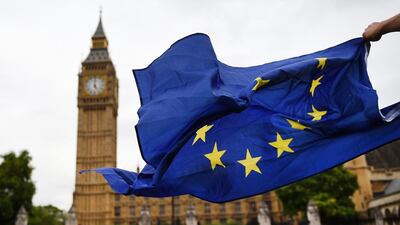British expats across the region will be getting ready to cash in on renewed sterling weakness if the pound comes under further pressure this week.
Currency exchanges are already reporting a surge in remittances to the UK after sterling took a hammering last week, hitting a new 31-year low.
Remittance volumes handled by UAE Exchange surged 135 per cent last week compared to the same week a month earlier. “Though uncertainties prevail around the UK’s economic prospects outside the EU, British expats are cashing in on the favourable exchange rate,” said chief executive Promoth Manghat.
Now top banks are predicting further pain for the pound.
Banks that include HSBC, Goldman Sachs, Deutsche Bank and Bank of America all expect the pound to come under further pressure after tumbling about 6 per cent this month as traders eye Brexit-related risks.
The dollar, to which the UAE dirham is pegged, received a further boost last week after the publication of positive retail industry data.
The post-Brexit slide has been good news for British expatriates in dollar-pegged economies remitting funds home. While Dh1,000 yesterday fetched about £223, before the June 23 referendum the same amount would only have bought about £185.
The pound has been a big driver of global currency volatility since Britain voted to leave the European Union in June.
The pound dropped about 10 per cent immediately after the vote and has extended losses since to almost 20 per cent.
A “flash crash” of the currency on October 7 created more concerns around negotiations with Brussels on the country’s departure from the EU.
Trading volatility is being fuelled by speculation over the as yet undefined nature of the UK’s departure from the EU and what kind of trading relationship it will have with the bloc after it leaves.
A so-called “soft” Brexit would preserve some preferential access, while a “hard” exit would mean the UK would essentially trade under WTO rules.
A report due to be released today from Ernst & Young’s Item Club was expected to say that signs of resilience in the UK economy since the Brexit vote may be lulling people into a false sense of security, Bloomberg reported.
The Bank of England governor Mark Carney on Friday said that the bank was not indifferent to the level of the pound. That helped to support the currency.
Although he reiterated the usual position that the Bank of England did not target a particular rate of exchange for sterling, the Canadian-born bank governor elaborated on its significance for the economy.
“Our job is not to target the exchange rate, our job is to target inflation,” he said during a public meeting. “But that doesn’t mean we’re indifferent to the level of sterling. It does matter, ultimately, [for] inflation and over the course of two to three years out, so it matters to the conduct of monetary policy,” Reuters reported.
scronin@thenational.ae
Follow The National's Business section on Twitter

